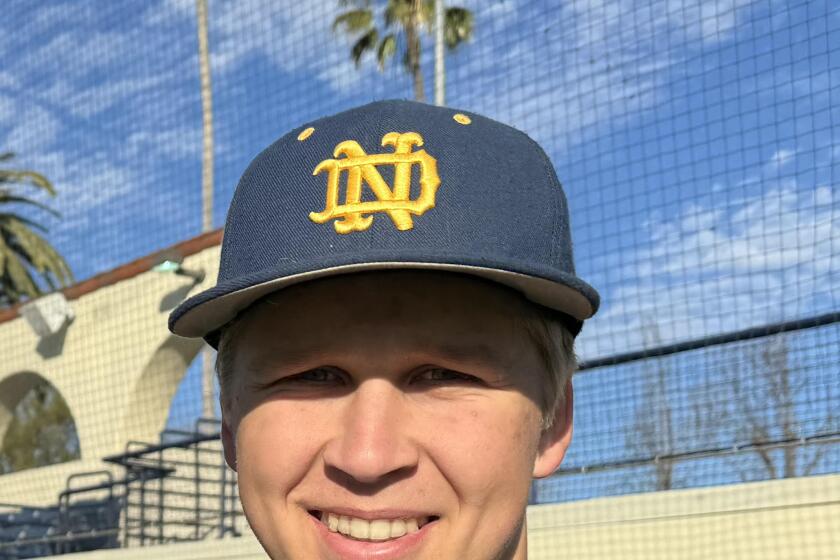A Legal Legacy: More Outcomes Being Determined in Higher Courts
High school teams found a new place to play in the ‘80s. Rather than decide their fates on the football field or basketball court, several county high schools fought through the legal system.
Stan Thomas, Southern Section commissioner, best summed it up by saying, “(Increasingly), the courts are doing our business.”
Court cases involving high school sports increased at an alarming rate during the decade. Administrators from dues-paying member schools of the Southern Section routinely challenged rules and regulations. Some feared the equity in competition was threatened by a swift gavel.
Forfeitures, and subsequent litigation, by the Huntington Beach and Savanna football teams this fall presented exhausting challenges to the attorneys representing the Southern Section.
Andrew W. Patterson, attorney for the California Interscholastic Federation, successfully defended the cases but heeded this warning: “I guess the courts will eventually tell us where our boundaries are.
“When it comes down to it, what we’re really talking about here is sports. A high school game. In a broad social sense, we’ve got freeways to maintain, biology books to be bought and biology teachers to be paid. How much out of the pie do they (parents and students) want?”
There were times when it appeared as if some parents wouldn’t settle for anything less than the entire pie.
Huntington Beach and Savanna culminated the trend with two court cases this fall.
Huntington Beach announced it was forfeiting eight football victories, its share of the Sunset League title and its berth in the Division I playoffs, for using an ineligible player.
League principals ruled that tackle David Roman had failed to follow the Southern Section’s guardianship guidelines within Huntington Beach’s attendance area. Roman’s mother, his legal guardian, resided in Maryland, while he lived with his older brother in Huntington Beach.
It was a clear violation, but boosters sought a restraining order in an effort to reinstate the school in the playoffs. Huntington Beach was granted a restraining order but the decision was reversed two days later in Orange County Superior Court.
Next up was Savanna’s football team, which had lost its first league championship since the school opened in 1961 for using an ineligible player.
Savanna forfeited six victories, a tie and its berth in the Division VI playoffs when it was discovered that linebacker Ray Leuta was attending his fifth high school in four years.
Again, this was the case of an administrative error. But Savanna took its case to Orange County Superior Court, where Commissioner Julian Cimbaluk ruled there were no grounds to reinstate the school’s team.
“We never challenged the CIF over the eligibility of the player,” said Fred DiPalma, Savanna coach. “We felt we were in the playoffs and there were no grounds to remove us.”
Only two years earlier, Bolsa Grande’s football program reached a pinnacle in the school’s 28-year history by finishing the 1987 season as the county’s top-ranked team.
Bolsa Grande had a 20-game winning streak that spanned two years and the school was favored to win a second consecutive Central Conference championship when vice principal Jim Monahan discovered an ineligible player while making a routine grade check.
The school forfeited five victories and its Garden Grove League championship because of a clerical error.
“It was one of the most difficult things (forfeiting the games) I’ve ever had to do in my 21 years in education,” Monahan said.
The league’s principals voted to allow Bolsa Grande to continue in the playoffs, but Bolsa Grande was upset in the first round by Saddleback.
“That day, something died inside of me,” said Tom Goode, Bolsa Grande defensive end. “There’s been something missing inside of me since that day. They took something away from us, and it’s very hard to accept.”
That year, Thomas reflected upon forfeitures by football teams at Bolsa Grande, La Habra and Laguna Hills and said, “I absolutely hate to see kids denied when they’ve worked so hard. Maybe we need to take a long look at this.”
But athletes continued to be punished for administrative errors.
The most celebrated forfeiture of the decade also took place in 1987.
Dick Enright, Capistrano Valley football coach, was suspended and the Cougars were ordered to forfeit a 22-21 victory over El Toro after a nine-hour hearing in which Enright admitted he watched a videotape of El Toro’s practice before the game.
Enright told a committee that an acquaintance, Mark Donohoo, a former El Toro football player, filmed an El Toro practice and played the 10-minute videotape at Enright’s home.
Donohoo testified that he taped the practice from his father’s camper parked along Serrano Road, about 50 yards from El Toro’s practice field. He later telephoned Enright and told him, “I have something that may help you.”
When asked what provoked Donohoo to film his alma mater’s practice session, he said, “That’s a question I’m going to have to live with.”
Enright resigned three days later rather than serve the suspension. Later, he said, “For 15 or 20 minutes, I didn’t use my head and this is what I’ll be remembered for.”
Controversy wasn’t limited to the football field. Ocean View’s basketball team made headlines in March 1985 when Jim Harris was relieved of his coaching duties and the school was ordered to forfeit its Sunset League title and runner-up plaque in the Southern Section 5-A playoffs.
Officials of the Huntington Beach Union High School District ruled that Lynwood transfers Ricky Butler and Desi Hazely were ineligible because of “undue influence” by Harris to “retain them at the school.”
Harris was later reinstated by Ocean View principal John Myers, but the Southern Section’s executive committee ruled that the basketball team could not participate in the 1986 playoffs and placed the program on two-years’ probation.
Three years later, Mater Dei’s athletic program was placed on probation for one year in February 1988 after the executive committee found the school guilty of recruiting violations.
Dennis Evans, then principal at Corona del Mar, accused Mater Dei coaches and administrators of undue influence in recruiting three athletes before the start of the 1987-88 school year.
The committee ruled that quarterback Danny O’Neil and wide receivers Warren and Weston Johnson, who attended Corona del Mar, were unduely influenced by Mater Dei administrators to transfer to the parochial school. O’Neil did transfer to Mater Dei.
John Merino, an administrator at Mater Dei for 24 years, was removed from overseeing any interscholastic athletic activities after admitting he arranged meetings with the three athletes, their parents and Mater Dei basketball Coach Gary McKnight and then-football Coach Chuck Gallo.
Mater Dei wasn’t the only parochial school mired in controversy in the ‘80s. Santa Margarita became a focal point of heated debate before the school had played its first varsity game.
For nearly two years, the 3-year-old school, nestled near the foothills in Rancho Santa Margarita, had sought a league for its athletic teams.
The school was refused entrance into leagues with the county’s public schools because of its unlimited boundaries from which it can attract athletes. Santa Margarita was refused entrance into the parochial leagues by Southern California’s Catholic schools for geographic reasons. The school’s closest competitor, Mater Dei, is 28 miles away.
Last spring, the Southern Section executive committee finally voted to place the school in the Parochial Geographic Area for the purpose of placing it in a league. And finally, Santa Margarita was placed in the Angelus League for the 1989-90 season.
Servite also had its share of controversy when seven basketball players left the program during the summer of 1984.
The so-called “Servite Seven,” including all-league center Jaime Cardiche and guard Mitch Brown, left the program, pointing to then-Coach Larry Walker as the reason for leaving.
Servite also lost Robbie Burrer, Kent Solomon, Steve Balstad, Baron Coenen and Mike Meyers, who all became starters at public schools.
“Kids leave all the time, it’s not that big a story,” Walker said. Four years later, Walker was relieved of his coaching duties and the school has yet to regain the prominence it once had in basketball.
Get our high school sports newsletter
Prep Rally is devoted to the SoCal high school sports experience, bringing you scores, stories and a behind-the-scenes look at what makes prep sports so popular.
You may occasionally receive promotional content from the Los Angeles Times.


